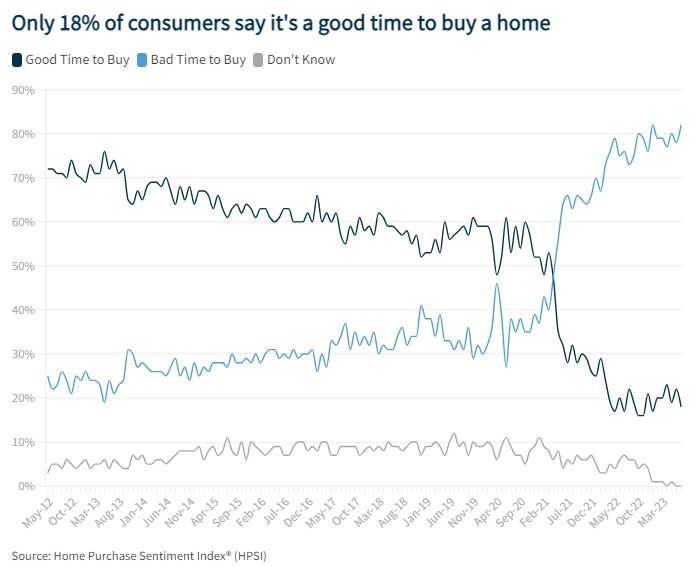 Fannie Mae’s Home Purchase Sentiment Index (HPSI) increased slightly in July as consumers’ increased confidence regarding their personal financial situations was largely offset by further pessimism toward homebuying conditions.
Fannie Mae’s Home Purchase Sentiment Index (HPSI) increased slightly in July as consumers’ increased confidence regarding their personal financial situations was largely offset by further pessimism toward homebuying conditions.
All-in-all, three of the HPSI’s six components increased month-over-month, including components measuring job security and home price expatiations.
However, 82% of consumers reported that it’s a “bad time to buy” a home, a survey high and up from 78% in June. Yearly, the full index is up 4.0 points year-over-year.
“While consumers are reporting confidence in the components related to their personal financial situations, it’s unlikely we’ll see housing sentiment catch up to other broader economic confidence measures until there is meaningful improvement to home purchase affordability,” said Doug Duncan, Fannie Mae Senior VP and Chief Economist. “In July, a significant majority of consumers indicated that their jobs are stable and that their incomes are the same or better than they were twelve months ago. However, homebuying sentiment once again matched its all-time low, with only 18% telling us that it's a good time to buy a home. Unsurprisingly, consumers continue to attribute the challenging conditions to high home prices and unfavorable mortgage rates.”
“Further, the share of consumers expecting home prices to continue to rise has also been on a steady climb since March, which may only add to perceptions of unaffordability,” Duncan said. “Additionally, we have not seen much movement in the ‘good time to sell’ component over the last few months, an indication that the current low levels of existing homes for sale will likely continue to persist in the near term, as also reflected in our latest forecast.”
HPSI purchase sentiment index compenent highlights increased in July by 0.8points to a level of 66.8 The HPSI in up 4 points year-over-year.

Component data, as highlighted by Fannie Mae includes:
- Good/Bad Time to Buy: The percentage of respondents who say it is a good time to buy a home decreased from 22% to 18%, while the percentage who say it is a bad time to buy increased from 78% to 82%. As a result, the net share of those who say it is a good time to buy decreased 8 percentage points month over month.
- Good/Bad Time to Sell: The percentage of respondents who say it is a good time to sell a home remained unchanged at 64%, while the percentage who say it’s a bad time to sell remained unchanged at 36%. As a result, the net share of those who say it is a good time to sell remained unchanged month over month.
- Home Price Expectations: The percentage of respondents who say home prices will go up in the next 12 months increased from 36% to 41%, while the percentage who say home prices will go down decreased from 26% to 24%. The share who think home prices will stay the same decreased from 37% to 34%. As a result, the net share of those who say home prices will go up in the next 12 months increased 6 percentage points month over month.
- Mortgage Rate Expectations: The percentage of respondents who say mortgage rates will go down in the next 12 months remained unchanged at 16%, while the percentage who expect mortgage rates to go up decreased from 47% to 45%. The share who think mortgage rates will stay the same increased from 36% to 38%. As a result, the net share of those who say mortgage rates will go down over the next 12 months increased 3 percentage points month over month.
- Job Loss Concern: The percentage of respondents who say they are not concerned about losing their job in the next 12 months increased from 77% to 80%, while the percentage who say they are concerned decreased 2 percentage points from 22% to 20%. As a result, the net share of those who say they are not concerned about losing their job increased 6 percentage points month over month.
- Household Income: The percentage of respondents who say their household income is significantly higher than it was 12 months ago remained unchanged at 19%, while the percentage who say their household income is significantly lower remained unchanged at 10%. The percentage who say their household income is about the same remained unchanged at 71%. As a result, the net share of those who say their household income is significantly higher than it was 12 months ago remained unchanged month over month.
Click here to view the full report.

 theMReport.com Your trusted source for mortgage banking news
theMReport.com Your trusted source for mortgage banking news








